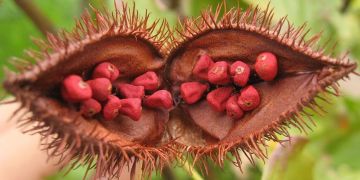What is achiote, exactly? Achiote is the common name for the seed that grows inside the fruit of the achiote (Bixa orellana) tree. In nature, the achiote is commonly found in South America and the Caribbean and a few other areas where the weather is tropical or subtropical.
Achiote Seeds
In fall, the achiote fruit ripens and falls right off of the tree. The fruit itself is not edible. But the seeds inside are. The edible pulp around the seeds tastes similar to fresh pepper with a hint of nutmeg sweetness. It is commonly dried, ground and infused into oil to make a concoction called annatto. Annatto is frequently added to dishes to punch up the flavor in West Indian and Latin American cuisine.
Although you may not have tasted the spicy flavor of achiote, you've probably eaten it before. Achiote's widest commercial use is as a natural food coloring made from the seed's coating. Many orange or yellow manufactured foods are colored with achiote. Natural and processed cheeses, butter and margarine, cakes, cookies, snacks and cereals are all commonly colored with achiote. Foods colored with achiote seed are labeled "colored with annatto".
The bright yellow color of Achiote is due to its high bixin levels. Bixins are powerful carotenoids like the kind found in carrots. Most annatto is 70 to 80 percent bixin by weight. The brighter the annatto mixture, the higher the bixin content.
One of the most powerful benefits of carotenoids is their ability to protect eye health. UV rays are everywhere. While they warm and illuminate the earth, the also damage your eyes. Carotenoids like bixin enter the eye and help them to absorb harmful rays and prevent cataracts and premature blindness.
The carotenoids are also potent antioxidants. Antioxidants prevent the signs of ageing by fighting off the free radicals that destroy cells. Carotenoids also protect general health. Studies show that people who eat carotenoids from natural sources like annatto suffer from fewer chronic diseases and live longer on average than those who are missing carotenoids from their diets.
Achiote Leaves
The native tribes in the South American countries where achiote grows were the first to discover achiote medicinal properties. While the seeds have the most important culinary use, achiote leaves were the first part of the tree used as an herb. The leaves have a number of medicinal properties that heal external as well as internal ailments.
Achiote leaves have anti-inflammatory properties. When a decoction is made from achiote leaves and alcohol and applied topically to the skin, it soothes a number of skin disorders, infections and damage including rashes, burns, cuts and other ailments. The decoction can also be used as a vaginal douche to cure vaginal infections.
When ingested, achiote leaves provide even more benefits. Achiote leaves are one of the richest sources of tocotrienols currently known. Tocotrienols are important because they limit the liver's ability to produce LDL cholesterol. That's the kind of cholesterol that clogs arteries and causes heart attacks.
The leaves' astringent or anti-inflammatory properties also make it a potent digestive aid. A tea steeped from the leaves of the achiote tree help to stop diarrhea and alleviate the symptoms of dysentery. Three daily cups of tea also improve general digestive problems or discomfort.
The more scientists investigate achiote leaves, the more benefits they find. Recent studies reveal that all parts of the achiote plant have hypoglycemic properties. A daily ingested dose of a tea made out of the achiote leaves or roots reduce blood glucose levels and prevent spikes in blood glucose after a meal.
In fact, medical studies of the powerful healing properties of achiote are just beginning. So far, the anecdotal evidence suggests that achiote may have certain properties that fight prostate cancer. For centuries, shamanic healers in South America have used a tea made from achiote leaves to make a strong tea consumed three times daily.
Western medicine is just beginning to discover the power of achiote. Anecdotal evidence suggests that the different parts of the achiote tree can improve heart health, heal reproductive problems, eliminate systemic infections and more.





